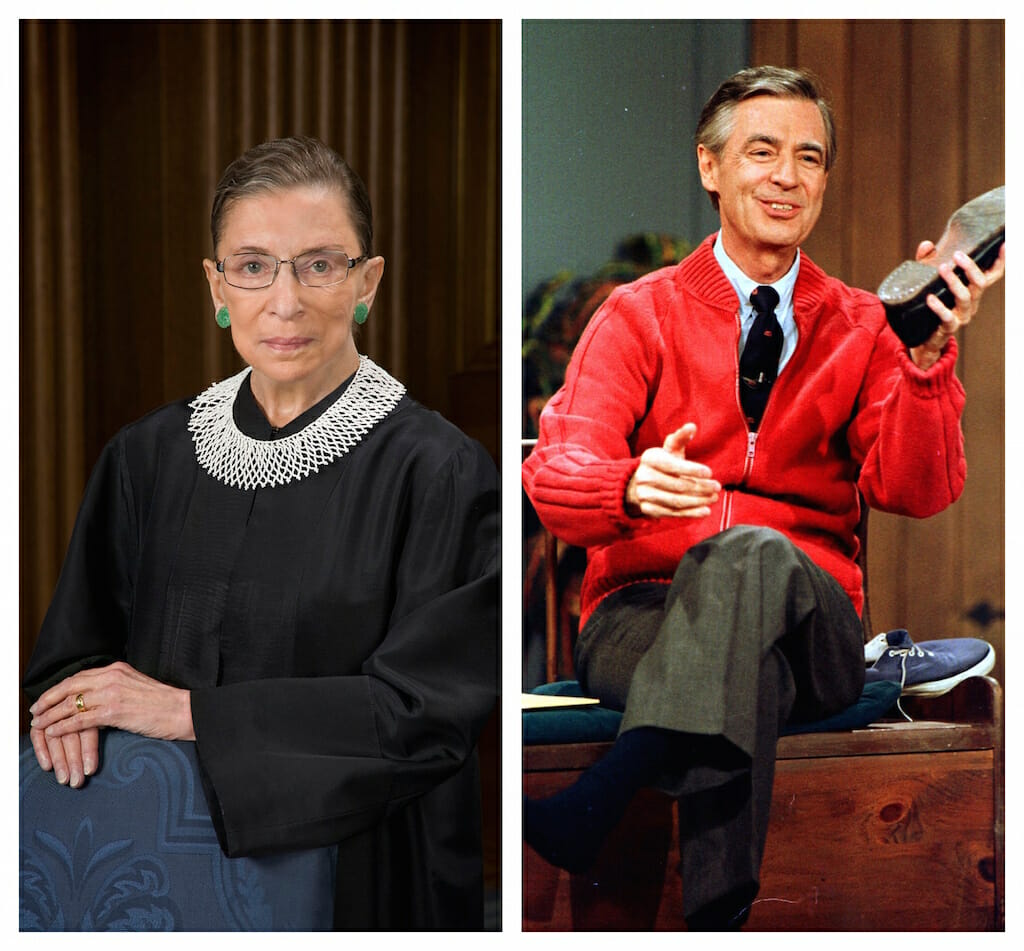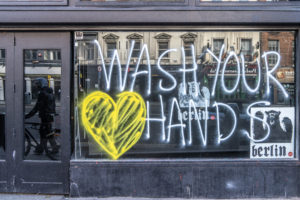Justice Ginsburg and Mr. Rogers: Antidotes to Trumpism
Hers-and-his documentaries are the surprise art-house hits of the summer. It’s as if they were designed to mend our frayed social fabric. Ruth Bader Ginsburg and Mr. Rogers. (Steve Petteway, Wikimedia / Gene Puskar, AP)
Ruth Bader Ginsburg and Mr. Rogers. (Steve Petteway, Wikimedia / Gene Puskar, AP)
At a time when the occupant of 1600 Pennsylvania Ave. lacks a superego and the characters on multiplex screens mostly are superheroes, it’s not easy to find individuals of judgment or of human scale.
Still, if you want to avoid the bombast and gigantism of cable news and of movies like “Avengers: Infinity War,” “The Incredibles” and “Jurassic World,” then look for the soft-spoken, life-size documentaries “RBG” and “Won’t You Be My Neighbor?” One is an affectionate biography of Ruth Bader Ginsburg, the five-foot giant of the U.S. Supreme Court and popular embodiment of liberal values. The other is an intimate portrait of Fred Rogers, the six-foot pillar of children’s television and a lifelong Republican.
Politics is not the point of either film. RBG’s career-long commitment to fairness and Rogers’ to empathy make the indefatigable justice, 85, and the late TV host, who would have been 90 this year, spiritual bedfellows. At the box office, these hers-and-his documentaries are the surprise art-house hits of the summer, ordinarily a time when superheroes and satiric comedies sell all the tickets.
The draw of these two modest documentaries is of particular interest, says box-office analyst Paul Dergarabedian of ComScore, because it reflects the desire of moviegoers “to dive deeper into the human condition via the life stories of two notable and inspiring cultural figures in the midst of a very divisive and politically-charged climate.” Hear, hear.
Eight weeks out, “RBG” earned $11 million on fewer than 300 screens; after three weeks “Won’t You Be My Neighbor?” scored nearly $2 million on 348 screens. While it’s fair to say that neither is likely to gross as much as one of Michael Moore’s explicitly liberal critiques of Republicans (e.g., “Fahrenheit 9/11”) or Dinesh D’Souza’s conservative takedowns of Democrats (e.g., “Obama’s America”), by the evidence of diverse crowds I’ve seen at both it’s equally true that neither “RBG” nor “Neighbor” preaches to the choir.
Those of diametrically opposite political beliefs can agree with one of the justice’s early arguments before the Supreme Court that a widower denied survivor rights benefits by Social Security—which extended those benefits to widows—was an example of how gender inequality harms men as well as women. Likewise, those of differing convictions can embrace Mr. Rogers’ gentle modeling of inclusion when, at a time many protested integration of public swimming pools, on television he soaked his feet in a wading pool alongside an African-American to show how easy and natural it could—and should—be.
Incrementalists both, the justice and the TV host embraced two principles: that slow and steady wins the race and the debate; and that when one adopts a confrontational tone, the listener hears anger; when one adopts a conversational tone, the listener is more likely to hear what the speaker has to say.
Today, when everyone from cable television hosts and guests to congresspeople appear to be yelling over each other, it’s bracing to remember that Ginsburg and Rogers both emerged on the American scene at a comparably polarized moment in American history. “Mr. Rogers’ Neighborhood” made its television debut in 1968, as anti-war protesters faced off against the Silent Majority. Ginsburg attained public prominence in 1972, when she co-founded the Women’s Rights Project at the ACLU.
Across America both documentaries play to sell-out crowds. It’s as if they were intentionally designed to mend the frayed social fabric or engineered as an antidote to Trumpism. Kudos to “RBG” directors Betsy West and Julie Cohen and to “Neighbor” director Morgan Neville for making movies that remind us of the importance of comity, community and consensus.
Independent journalism is under threat and overshadowed by heavily funded mainstream media.
You can help level the playing field. Become a member.
Your tax-deductible contribution keeps us digging beneath the headlines to give you thought-provoking, investigative reporting and analysis that unearths what's really happening- without compromise.
Give today to support our courageous, independent journalists.





You need to be a supporter to comment.
There are currently no responses to this article.
Be the first to respond.